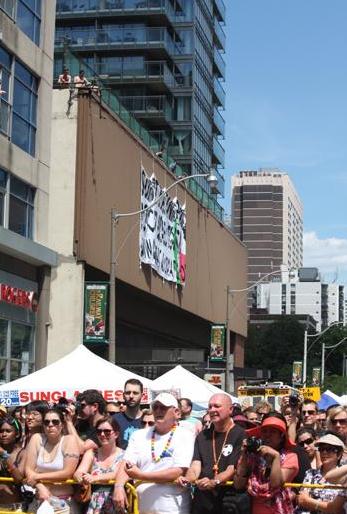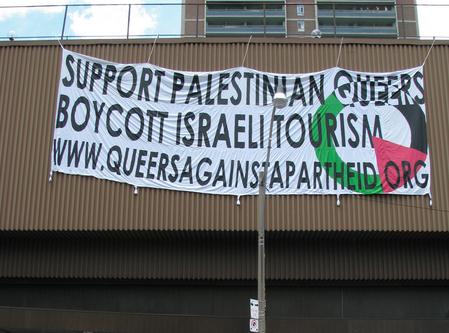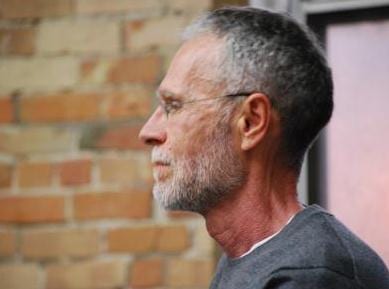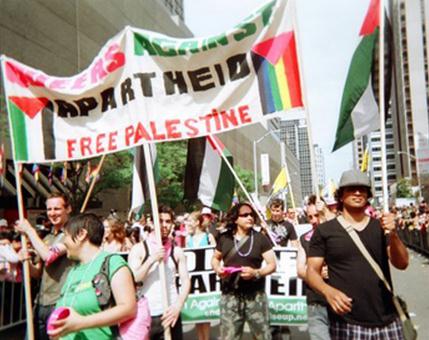
On the day of the 2011 Pride parade, QuAIA dropped a 40-foot banner off the roof of the Wellesley subway station. Credit: Marcus McCann (Xtra file photo)

QuAIA confirms the group will most likely march in the 2012 Pride parade. Credit: Courtesy of QuAIA

Long-time queer activist Tim McCaskell. Credit: Xtra file photo
Tim McCaskell says the group Queers Against Israeli Apartheid (QuAIA) will likely march in the 2012 Toronto Pride parade. No application has been submitted yet to Pride Toronto (PT), but, he says, plans to participate in the parade are being developed.
“Unless something extraordinary happens, our default will be to march,” McCaskell says. “We have as much right to be in the parade as anyone else.”
Last year, McCaskell says, Toronto Mayor Rob Ford and Councillor Giorgio Mammoliti cited QuAIA as one reason the city should refuse to participate in Pride. QuAIA’s presence was also cited in the attempt to withhold city funding and in-kind services for PT. Ford, Mammoliti, the Jewish Defense League and others argued that QuAIA, which advocates for a boycott, divestment and sanctions against the state of Isreal, is a hate group.
McCaskell says some members of city council argued that the mayor could be in physical danger if QuAIA marched. Mammoliti was seen video taping last year’s Dyke March in a stated effort to capture marchers “using hate speech.”
But in April last year, a report from the city manager’s office concluded that QuAIA’s presence in the parade did not violate the city’s anti-discrimination policy. Even after that report was released, the city tried to compel PT to “guarantee a QuAIA-free week.”
Vindicated by the decision, QuAIA bowed out from participating in the parade last year. The group did not even submit an application. Instead, on the day of the parade, group members dropped a 40-foot banner from the roof of the Wellesley subway station.
“Rob Ford wants to use us as an excuse to cut Pride funding, even though he has always opposed funding the parade, long before we showed up,” said QuAIA’s Elle Flanders at the time. “By holding our Pride events outside of the parade, we are forcing him to make a choice: fund Pride or have your real homophobic, rightwing agenda exposed.”
This year, McCaskell says he sees no reason the group wouldn’t participate in the parade. Plans will be discussed and finalized following the Town Hall for Political Queers at the 519 Church St Community Centre at 2pm on May 27.
“It has been such a fucking roller coaster for the past two years. We just want to attend Pride, carry our messages and have a great weekend,” McCaskell says. “That’s what Pride should be about, not these kind of entrenched battles around people’s right to self-expression, and whether or not people have the right to be there, which is hoisted on the community from the outside.”
The deadline to submit applications to march in the parade is June 1, at which time PT will post the list publicly, says PT co-chair Francisco Alvarez.
Alvarez points to the dispute-resolution committee, which was created following a recommendation in the Community Advisory Panel report, the result of a series of community meetings held last year. The committee would act as an arms-length arbitration body, made up of mostly lawyers, which would handle any complaints. The decision of the panel would be final, he says.
“The process is in place to handle any complaint about any type of group. That could be a religious group, environmental group or political group,” he says. “This takes the decision-making out of our hands because we’re not experts in human rights arbitration.”
So far, says Alvarez, that process has not been invoked. Since it hasn’t been tested, there’s no way to know how long the dispute-resolution process will be, so there may not be a verdict before Pride, he says.
“Given the complexity of different issues, we may not be able to resolve it before the parade,” he says. “If a complaint is received, but the resolution is not made before the parade, the group will be allowed to march . . . Obviously, QuAIA has the biggest profile,” he says.
Alvarez says he is somewhat concerned that QuAIA’s appearance at the parade could spark a new battle with the city. “I’m hoping it won’t. I feel the issue has kind of played itself out.
“I hope we are past those disagreements and we can all work together rather than against one another. I hope everyone accepts everyone else’s right to be there and express their opinions.”

 Why you can trust Xtra
Why you can trust Xtra


